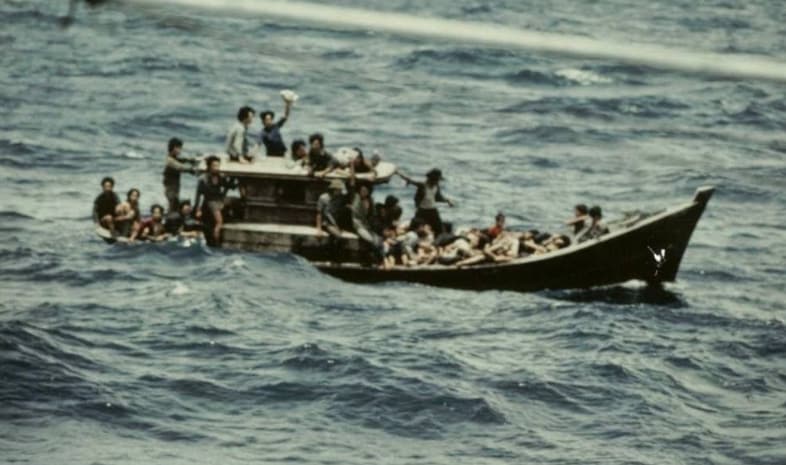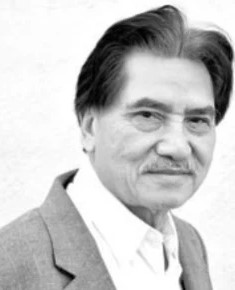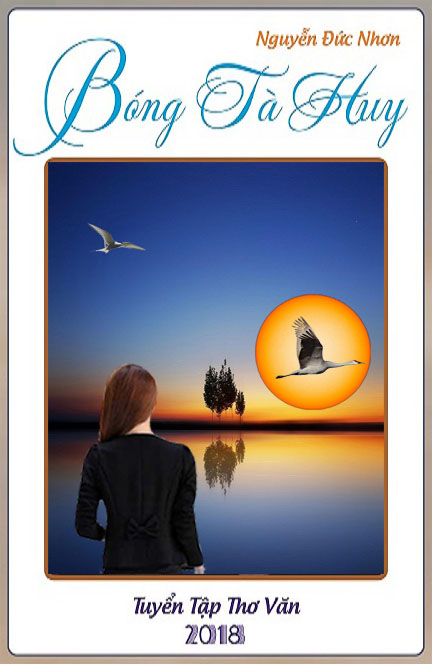Gọi Hồn
Trên Huyết Hải thuyền trôi về một chiếc
Chiều bầm đen trời rực rỡ đau thương
Thân chìm xuống băng tuyền giờ tận biệt
Sóng bạc đầu hối hả phủ trùng dương
Chiều bầm đen trời rực rỡ đau thương
Thân chìm xuống băng tuyền giờ tận biệt
Sóng bạc đầu hối hả phủ trùng dương
Thấp thoáng trần gian
Mịt mù bóng đảo
Trôi về Tây về Bắc về Đông
Trôi về đâu bốn bề thủy thảo
Về đâu kiếp đắm với thân trầm.
Hồn ơi dương thế xa dần
Hồn đi thôi nhé thủy âm là nhà
Hồn về trong cõi hà sa
Sống không trọn kiếp chết là hồi sinh.
Xong rồi một cõi u minh
Ngựa Hồ chim Việt biến hình mà đi.
Mịt mù bóng đảo
Trôi về Tây về Bắc về Đông
Trôi về đâu bốn bề thủy thảo
Về đâu kiếp đắm với thân trầm.
Hồn ơi dương thế xa dần
Hồn đi thôi nhé thủy âm là nhà
Hồn về trong cõi hà sa
Sống không trọn kiếp chết là hồi sinh.
Xong rồi một cõi u minh
Ngựa Hồ chim Việt biến hình mà đi.
Hồn vẫn ở la đà Nam Hải
Hồn còn trôi mê mải ngoài khơi
Hồn còn tầm tã mưa rơi
Tháng Tư máu chảy một trời sương tan.
Hồn còn trôi mê mải ngoài khơi
Hồn còn tầm tã mưa rơi
Tháng Tư máu chảy một trời sương tan.
Thân chìm đắm cõi điêu tàn nước cũ
Những lâu đài thành quách những vàng son
Những tân thư kỳ mặc những linh đường
Những rực rỡ của một thời dựng nước
Bao mắt mở bao tóc sầu dựng ngược
Bao tay cùm bao ngực vỡ hôm qua
Trong rêu xanh ngần ngật bóng sơn hà
Lướt hải phận về dưới trời cố quốc.
Những lâu đài thành quách những vàng son
Những tân thư kỳ mặc những linh đường
Những rực rỡ của một thời dựng nước
Bao mắt mở bao tóc sầu dựng ngược
Bao tay cùm bao ngực vỡ hôm qua
Trong rêu xanh ngần ngật bóng sơn hà
Lướt hải phận về dưới trời cố quốc.
Nhắm hướng hôi tanh
Chia bày trận mạc
Hồn binh tàn hỗn chiến Thủy Mộ Quan.
Chia bày trận mạc
Hồn binh tàn hỗn chiến Thủy Mộ Quan.
Đêm rơi thời hết vận tàn
Ô y cầu nhỏ người sang Lạc Hà
Thác rồi thân hóa phù sa
Mon men trở lại quê nhà mỗi đêm.
Ô y cầu nhỏ người sang Lạc Hà
Thác rồi thân hóa phù sa
Mon men trở lại quê nhà mỗi đêm.
Về đâu đêm tối
Hương lửa lung linh
Những ai còn bóng
Những ai mất hình
Hương lửa lung linh
Những ai còn bóng
Những ai mất hình
Những ai vào kiếp phù sinh
Hóa thân hồ hải làm binh giặc trời
Khi nào hết quỉ ngoài khơi
Ta vào lục địa ta hồi cố hương
Hóa thân hồ hải làm binh giặc trời
Khi nào hết quỉ ngoài khơi
Ta vào lục địa ta hồi cố hương
Cùng nhau ta dựng lại nguồn
Chẻ tre đẵn gỗ vạch mương xây đình.
Ông Nghè về lại trong dinh
Tướng quân giữ ải thư sinh dưới đèn.
Từ Thức lại trở về tiên
Sĩ phu giảng huấn người hiền bình văn
Nương dâu trả lại con tằm
Ruộng xanh trả bác nông dân cần cù.
Ngựa ông trả lại thằng cu
Nhà chung trả Chúa chùa tu trả Thầy
Quạt mo tao trả cho mày
Các cô yếm thắm trả bầy trai tơ.
Việt Nam dựng lại sơn hà
Móng rồng năm lượt Quê Nhà phục hưng.
Chẻ tre đẵn gỗ vạch mương xây đình.
Ông Nghè về lại trong dinh
Tướng quân giữ ải thư sinh dưới đèn.
Từ Thức lại trở về tiên
Sĩ phu giảng huấn người hiền bình văn
Nương dâu trả lại con tằm
Ruộng xanh trả bác nông dân cần cù.
Ngựa ông trả lại thằng cu
Nhà chung trả Chúa chùa tu trả Thầy
Quạt mo tao trả cho mày
Các cô yếm thắm trả bầy trai tơ.
Việt Nam dựng lại sơn hà
Móng rồng năm lượt Quê Nhà phục hưng.
Đã tỉnh sầu u thương tiếc hết
Bình minh lên nghe, hoàng hôn biết
Chim lạnh về Nam sông núi ta
Không nói không cười chân trở bước.
Nỏ thần thủa trước
Gươm bén hồ xưa
Tràn lên như nước vỡ bờ
Lạc Long lại đón Âu Cơ về thuyền.
Các con từ dưới biển lên
Từ trên núi xuống hai miền gặp nhau.
Bình minh lên nghe, hoàng hôn biết
Chim lạnh về Nam sông núi ta
Không nói không cười chân trở bước.
Nỏ thần thủa trước
Gươm bén hồ xưa
Tràn lên như nước vỡ bờ
Lạc Long lại đón Âu Cơ về thuyền.
Các con từ dưới biển lên
Từ trên núi xuống hai miền gặp nhau.
Năm nghìn năm lại bắt đầu
Chim nào tha đá người đâu vá trời
Chúng ta rời bỏ xứ người
Loài chim trốn tuyết qui hồi cố hương.
Chim nào tha đá người đâu vá trời
Chúng ta rời bỏ xứ người
Loài chim trốn tuyết qui hồi cố hương.
Viên Linh [1]

Evoking the spirits of those who perished at sea [2]
On the Blood Sea a single boat flowed back
The splendid evening sunlight gradually darkened
The bodies had sunk into the cold water from the boat
White-crested waves hurriedly covered the sea
The splendid evening sunlight gradually darkened
The bodies had sunk into the cold water from the boat
White-crested waves hurriedly covered the sea
The world in a flashback
The island invisible in a mist
Drifting to the west or the east
The four corners were all marine plants
Whither would float these drowned bodies?
The island invisible in a mist
Drifting to the west or the east
The four corners were all marine plants
Whither would float these drowned bodies?
Dear spirits, with this world farther and farther from you
Godspeed to your new abode undersea
You are returning to the realm of sand and water
With your lives cut short, you will come to life again after death
Done is your somber and dark world
The Hồ horse Việt bird identity shall metamorphose as you depart
Godspeed to your new abode undersea
You are returning to the realm of sand and water
With your lives cut short, you will come to life again after death
Done is your somber and dark world
The Hồ horse Việt bird identity shall metamorphose as you depart
Yet, you still linger on the South Sea
Longingly drifting on the country’s seacoast
Crying torrentially
Like the blood that gushed in April since early mist
Longingly drifting on the country’s seacoast
Crying torrentially
Like the blood that gushed in April since early mist
The spirits’ submerged bodies now drift back to the desolate old country
With its castles and citadels in the golden days
Its great books, its hallowed shrines
Its splendor in the time of country-building [3]
With staring eyes and rising hairs
A myriad of former prisoners and injured people
In green moss, clinging to the image of the land
Speedily float toward their former country
With its castles and citadels in the golden days
Its great books, its hallowed shrines
Its splendor in the time of country-building [3]
With staring eyes and rising hairs
A myriad of former prisoners and injured people
In green moss, clinging to the image of the land
Speedily float toward their former country
Targeting a land that is now putrid
Sharing battle plans
Spirits of disabled soldiers continue their war
from the Pass of Graves in the Sea
Sharing battle plans
Spirits of disabled soldiers continue their war
from the Pass of Graves in the Sea
When night ends, so does their chance
In black clothes they cross the Lạc Hà bridge [4]
In bodies that have turned into alluvium
Gingerly they return to their homeland every night
In black clothes they cross the Lạc Hà bridge [4]
In bodies that have turned into alluvium
Gingerly they return to their homeland every night
What is your destination in the dark
Amidst incense and flickering candlelight
Oh, those of you who keep your shadow
And those of you who have lost it all
Amidst incense and flickering candlelight
Oh, those of you who keep your shadow
And those of you who have lost it all
Having entered the cycle of lives
Let’s turn our seafaring bodies into celestial soldiers
Once we have dispatched all devils inhabiting our open sea
We will come ashore to our place of birth
Let’s turn our seafaring bodies into celestial soldiers
Once we have dispatched all devils inhabiting our open sea
We will come ashore to our place of birth
Together we will restore our traditions
Bamboo and timber will be cut to build moats and communal temples
The doctor of literature will return to his residence
The general to his frontier defense
The student to his desk
Từ Thức to fairyland [5]
Scholars to teaching, sages to literary review
Mulberry groves will go back to silkworms
Green rice paddies to hard-working farmers
The play horse to the young boy [6]
Monasteries to God, pagodas to the monk
The areca-spathe fan I will return to you [7]
Maidens in bright-red camisoles to young men
Vietnam will rebuild its nationhood
The five-claws dragon will herald our restored native land [8]
Bamboo and timber will be cut to build moats and communal temples
The doctor of literature will return to his residence
The general to his frontier defense
The student to his desk
Từ Thức to fairyland [5]
Scholars to teaching, sages to literary review
Mulberry groves will go back to silkworms
Green rice paddies to hard-working farmers
The play horse to the young boy [6]
Monasteries to God, pagodas to the monk
The areca-spathe fan I will return to you [7]
Maidens in bright-red camisoles to young men
Vietnam will rebuild its nationhood
The five-claws dragon will herald our restored native land [8]
Gone is all grief and regret
From dawn to dusk the news is heard
The cold birds have returned to the warm southern branch in their own land
Solemnly they come home
Magic crossbow of the past
Sharp sword from the old lake
Unstoppable is their revived power
Lạc Long welcomes Âu Cơ back to his boat
As their children up from the sea and
Down from the mountain are
From dawn to dusk the news is heard
The cold birds have returned to the warm southern branch in their own land
Solemnly they come home
Magic crossbow of the past
Sharp sword from the old lake
Unstoppable is their revived power
Lạc Long welcomes Âu Cơ back to his boat
As their children up from the sea and
Down from the mountain are
Our five-thousand-year legacy will start anew
The rock-carrying bird, the sky-mending lady [9]
We are leaving a foreign land
Like snow-shunning birds returning to their native land
The rock-carrying bird, the sky-mending lady [9]
We are leaving a foreign land
Like snow-shunning birds returning to their native land
Viên Linh
Đàm Trung Pháp translated into English and provided annotations
Đàm Trung Pháp translated into English and provided annotations

[1] Viên Linh is the pen name of Nguyễn Nam, born in 1938 in Hà Nam Province, North Vietnam. An accomplished poet and novelist, he has published numerous novels and poetic collections. His play Con Đường Ngựa Chạy brought him the 1972 Presidential Prize in Literature, and his novel Gió Thấp landed him the First Place in the Republic of Vietnam’s 1974 National Prizes in Literature and Arts. Among his best known poetic works are Hóa Thân (1964) and Thủy Mộ Quan (1982). Between 1961 and 1975, Viên Linh served as managing editor of several literary magazines in Saigon. Since his resettlement in the United States in 1975, he has earned his living as a newspaperman, a publisher, and currently as the editor and publisher of Khởi Hành, a literary review with an international readership.
[2] After April 1975, daring efforts by freedom-seeking Vietnamese people who took to the sea in decrepit boats were a great tragedy reported daily by the media, especially the Vietnamese-language press abroad. The most tragic aspect of this exodus was the starvation to death of children and the rape of women by sea pirates. By 1978, “boat people” had become well-known, and temporary refugee camps had been set up in various places in Southeast Asia. This poem is part of Viên Linh’s well-known work named Thủy Mộ Quan (The Pass of Graves in the Sea).
[3] That was when the Republic of Vietnam was established after the 1954 Geneva Agreement, with Saigon as its capital. It had a new flag and a new anthem, and more than 80 countries in the United Nations recognized it. In April of 1975, violating all signed agreements, communist North Vietnam overran this republic. As a result, more than 800,000 people from the South became boat people seeking freedom, and thousands of them drowned in the South China Sea.
[4] Lạc Hà (or Nại Hà) is the river of separation, spanned by a bridge. Crossing this bridge means entering the world of the dead.
[5] According to Vietnamese mythology, Từ Thức met a fairy named Giáng Hương and stayed with her in her world for a year. He became homesick and asked her to allow him a home visit, promising he would return. People and things back home had changed totally. An old man told him that Từ Thức was his grandfather who had disappeared 80 years earlier.
[6] The imaginary play horse for young boys in the old days was a long dried areca leaf that they dragged along the road, announcing their horse has arrived and asked people to feed it with grass.
[7] According to a legend, a young boy named “thằng bờm” had an areca-spathe fan. A rich man wanted to get it from him in exchange for expensive things, but to no avail. The boy finally agreed to just a handful of steamed rice. The story implies that the country people were realistic and not interested in vague promises.
[8] In Vietnamese paintings, a dragon has five claws in each foot. The Chinese dragon is painted with four claws in each foot.
[9] The bird “tinh vệ” and the lady named “Nữ Oa” in Chinese mythology were the symbols for people with tremendous determination and perseverance.































